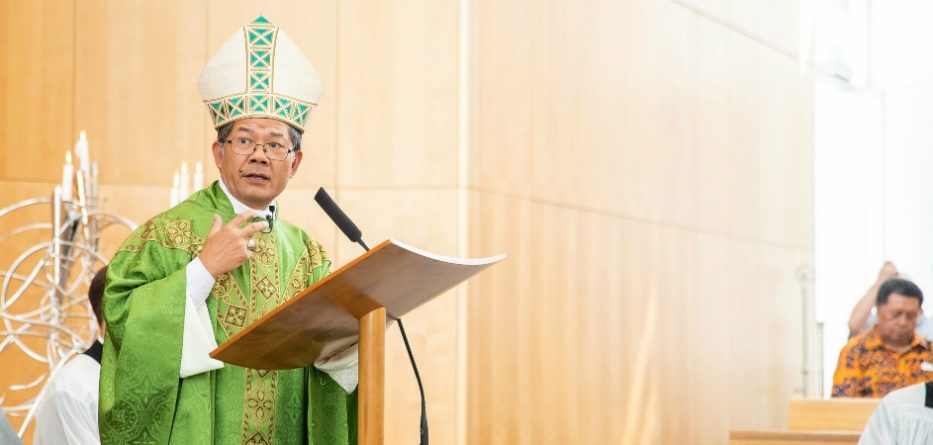Most Reverend Vincent Long Van Nguyen OFM Conv DD STL, Bishop of Parramatta
Homily for the 30th Sunday in Ordinary Time Year A 2020 at St Patrick’s Cathedral, Parramatta
Readings: Ex 22:20-26; 1Thes 1:5-10; Matthew 22:34-40
25 October 2020
Pushing the boundaries of love
Dear friends,
In the 60s and 70s, there was a popular song called What the World Needs Now Is Love. In the tumultuous context of the Vietnam War and civil rights movement, the song struck a chord with many people. Today, in the midst of a global crisis, what the world needs more than ever is the witness of the community committed to living out the radical demands of Christian love.
The pandemic has exposed a grossly inadequate system of world economy, including the failure to protect and care for the elderly, refugees, migrant workers, the precariously employed, the poor and the vulnerable. At a time when the global structures of human community are faltering, the world needs more than ever the witness of a community united in its effort to honour the dignity and worth of every human person no matter their race, colour or social condition, to serve the common good and live as one with God’s creation.
The Word of God this Sunday speaks to us about the importance of being such a community. God in Christ summons us to live and relate to each other in a way that is different to the trickle-down and survival of the fittest economic model. We are called to practice an ethic of concern, care, and support for one another, so no one is excluded from the table or left behind.
In the first reading, we hear how the children of Israel receive instructions as to how they should live and behave towards each other. In Egypt, the Israelites knew what it was like to be on the margins of society and to experience vulnerability because of their social status and ethnicity. Now in the Promise Land, they are told they must show understanding, compassion and empathy towards others who are in similar situations: the strangers, the widows, the orphans, the poor, and those in debt.
In effect, they are exhorted not to replicate the system of oppression that they themselves experienced in Egypt. Instead, they are to form a post-Exodus society, which would be the model for all the nations. This new society would be marked by concern for the common good and special attention to the most vulnerable. They are to be neighbour to one another and care for those on the margins.
This is also fundamentally the message of Jesus. Last Sunday, he summed up the command to be counter-cultural in this way: “Render to Caesar what belongs to Caesar and to God what belongs to God”. In other words, the duty of Israelites is to build God’s Kingdom of justice, love, and compassion as a contrast society to Caesar’s exploitative, ruthless, and oppressive system. In today’s Gospel, Jesus defines that same vision of God’s Kingdom in terms of loving God and neighbour. He reminds them of the Shema, which is the daily prayer calling them to love God over above everything else. He then joins this command with loving one’s neighbour, so that one cannot keep one without the other.
Jesus would later go a step further than the Old Testament. He would redefine the idea of a neighbour to include not only the comrade member of the covenant community but also those outside their circle and those considered beyond the pale. Through the Parable of the Good Samaritan, Jesus would push the boundaries of acceptance, inclusion and love to the limits.
Dear friends,
The early Christians understood the significance of being fundamentally counter-cultural in how they lived, how they related, how they shared resources with the disadvantaged. In the second reading, Paul acknowledges the Thessalonians for their faith and love for outsiders. “They broke with idolatry and became servants of the real, living God”. They embraced a life of faith, hope and love in contrast to their pagan counterparts. They reached out to others beyond their borders.
Pope Francis in his new encyclical appeals for a love that transcends borders and a social friendship that makes universal brotherhood possible. He calls on us to work on God’s plan for the full human flourishing of everyone without exception, with special care for the excluded and marginalised.
We are custodians of the Good News. The Kingdom vision of Jesus guides us as we endeavour to be a community that serves as an antidote to the politics of fear, self-interest and the economy of exclusion in our society. May we, like the early Christians in Thessalonika, share the Gospel with others “with the joy of the Holy Spirit” and show the world the witness of the true Christian love.








